21 Methanol Injection
These days, in the world of tuning, boosted applications are much more often the norm than the exception. When tuning boosted engines, be they supercharged, nitrous injected or turbocharged, a good tuner knows what the safe limits are for timing and Air/Fuel ratio. Furthermore, a good tuner knows that a particular combination is tuned to run on a specific set of conditions, but one of these conditions is impossible to completely control – Octane.
Octane in a heavily boosted and nitrous-ed application is a very big and obvious factor in controlling how much Compression, Boost/NOS and Timing can be mixed together at once. This is one of the reasons my shop is known for being very conservative with most of our customers’ tuning efforts when it comes to dealing with normally available pump unleaded fuels and boosted true street cars.
With the cost of today’s fuels it’s not uncommon to grab the nozzle at the local pump and select 93 octane and not really get 93 octane because of several different reasons, including winter blends, regional differences, fraud and many other reasons. This is why I’m very quick to recommend to the guys with the cars that have higher levels of boost to seriously consider race fuels or a mixture of race fuels as opposed to just unleaded pump premium fuels only. There is also a time and place where race fuels are needed exclusively on some applications.
We’ve actually achieved more reliability and less piston failure out of non-forged piston equipped, supercharged Mustang applications that make 15-18psi of boost running pure race fuels, like the locally available and popular “Turbo-Blue” 110 leaded race fuel. And had more failures with lower boosted applications like 8-10psi of boost using 93 pump unleaded fuels. It is actually quite common for a ton of our customers to get long healthy lives out of their stock, non-forged short blocks running well over 15psi of boost, non-intercooled with race fuels. This is because when you’re wiling to run race fuel full time, it’s always good stuff with usually no chance of getting “Bad Fuel” as can often happen with regular unleaded pump fuels. And when running race type fuels with your boosted application, depending on the car and combo you can get more aggressive with the tune and still not hurt it as easy as you would with a slightly aggressive 93 Octane tune.
This leads me to finally discuss the main reason for this page’s addition to my web site – Methanol injection.
As many of you forced induction guys have probably read in the mags or experienced already, Methanol is starting to catch on in the late model EFI performance scene.
I kinda-sorta cautiously watched as the magazines ran article after article about Methanol injection and until this past summer of 2005 I really didn’t take a big interest in it, until a customer of mine showed up for some tuning with a methanol kit already installed in his car and asked if I was willing to work with it and see what I thought of it. I was impressed with it overall and decided that this was probably going to be a popular add-on for a lot of our past, present and future customers with blowers.
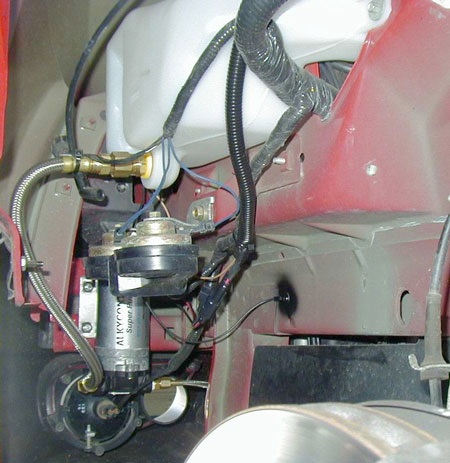
Methanol bottle and pump installed on a 94-04 Mustang
The key that has to be understood about Methanol injection is that it burns in the combustion chamber just like fuel. And this actually requires the rest of the tune to be adjusted accordingly. From what I’ve already experienced, you can’t just add a Methanol mix into the intake charge and expect a substantial gain in HP. In order to really gain from the Methanol injection, you need to add a pretty good amount of methanol, depending on the existing level of power/boost. When this correct amount of methanol is added, it will make your existing Air/Fuel ratio go very, very rich. So then you need to pull fuel from the engine management’s fuel map or normal tune to get it back to the desired A/F while the Methanol is spraying into the engine. Typically what we found is that when the Methanol is flowing you can run slightly leaner than you would have without methanol flowing. So if your booted combo is safe and runs good with a A/F of 11.5, with the Methanol flowing we would run a little leaner in the same application, like 11.8 to 12.00:1 – also adding more timing while the methanol is flowing.
Methanol is also a huge octane booster. We’re not sure exactly how much it raises a typical 93 octane application, but some say as high as 115-120 octane. Not sure about this yet, but it definitely raises the octane substantially from 93 judging from the amount of additional spark we can add to a non-methanol tune. Methanol also lowers the inlet temps quite a bit – as much as 60 – 100+ degrees.
So far from what we’ve experienced on a few cars equipped with “non-intercooled” blowers making no less then 12-14psi and Methanol injection, we’ve already achieved gains of no less then 40-60 RWHP! Not bad for a real-world bolt-on. Plus, I feel that this extra power comes in safer as well, because of the cooling effect and octane gain the Methanol provides.
At this time we’ve started using Methanol kits from a company in Florida called Alky Controls. His kits come with a stock Mustang windshield washer reservoir modified for using Methanol and a sensor installed in it to warn when the Methanol is getting low. The kit uses the MAF signal to determine when and how much Methanol to start to flow proportionally. This has already proven to make for a pretty seamless transition from no methanol to when the methanol starts to flow. As mentioned earlier we make about a 20-30% reduction in commanded WOT fuel tables in a typical Mustang tune when seeing about 12-14psi of non-intercooled boost when the Methanol is flowing. We are at this time using straight methanol in all of our installations. No mixing or any other chemicals, just straight methanol.
So far we only have complete kits for 94-04 Mustangs using their stock windshield washer bottle as a reservoir for the Methanol. We will have a complete kit for the 2005+ Mustangs as well very soon.
Methanol Injection
Monday, November 21, 2005
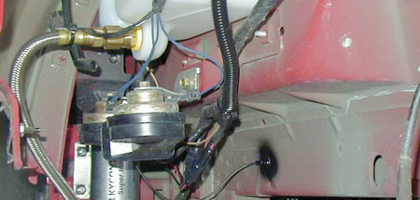
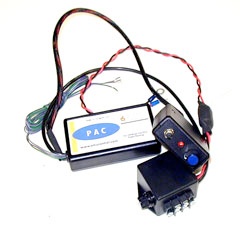
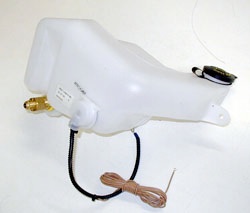
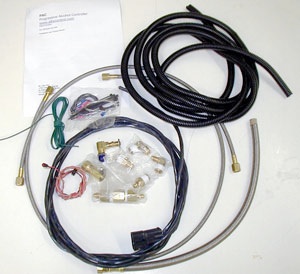
Proportional Methanol Controller
Modified 94-04 Mustang windshield bottle with low level float
